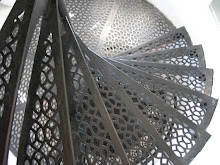So when my friend Annette described the devastation of her crocuses as "heartbreaking," I didn't think she was overreacting. There they were this morning, her favorite deep purple variety. This afternoon while she napped, unsuspecting, something snipped them off an inch from the ground. She thinks it might be the neighborhood rabbit that has been living on birdseed and (she admits) apples tossed into the yard when the snowfalls were especially deep.
Spring bulbs are an act of faith. They are like the little paper flowers I loved as a child--the shells that are dropped into water that produce a paper bloom, except that the payoff takes six months instead of six minutes. I raced home to make sure that my own crocuses were intact. They were, but as I stood there looking at them, I began to wonder if the rabbit didn't have a point. We plant them for beauty, the rabbit eats them for survival. Doesn't the rabbit have more of a claim? Did the act of tossing apples into the yard create a sense of entitlement? (just kidding here). The real question is, when we mess with nature by helping a rabbit survive the winter, we should perhaps not be too outraged when he eats our crocuses in the Spring?

4 comments:
Here in Oregon there has been a lot of debate about killing off a bunch of sea lions because they are eating too many salmon. http://www.oregonlive.com/commentary
/oregonian/index.ssf?/base
/editorial/1206658593151440.
xml&coll=7
Although the crocus situation is a bit different -- both situations definitely beg the question about messing with nature.
Talking about messing with nature. Reading Theroux's adventures across Africa. He was talking about Children (phew) in Ethiopia. Aids agencies went in with the objective of helping children survive. They would go in with Unimix (corn-soy blend, which in itself is highly suspicious, as they are #1 and #2 top produces here; with ethanol around, I should say, poor children) and ensure that the children are fed. They have to do it themselves because if not, the parents will eat the food. So we have parents starving and the children surviving due a totally artificial food. The aid agency, means well, I guess, but it does throw natural selection out the window.
So, if I understand the sea lion situation, the chinook run is larger than usual, so fishing quotas have been raised by 30%, but no one wants to share with the sea lions? Not to mention making the chinook sitting, uh, ducks because they have to negotiate a man-made dam to spawn.
The aid story is disturbing on so many levels. Anyone who flies knows you put your own oxygen mask on first so you can help your children. And don't even get me started on the artificial food. Has anyone read "The Trouble with Africa: Why Foreign Aid Isn't Working" by Robert Calderisi? It was well-reviewed but I don't have any first-hand recommendations.
Post a Comment